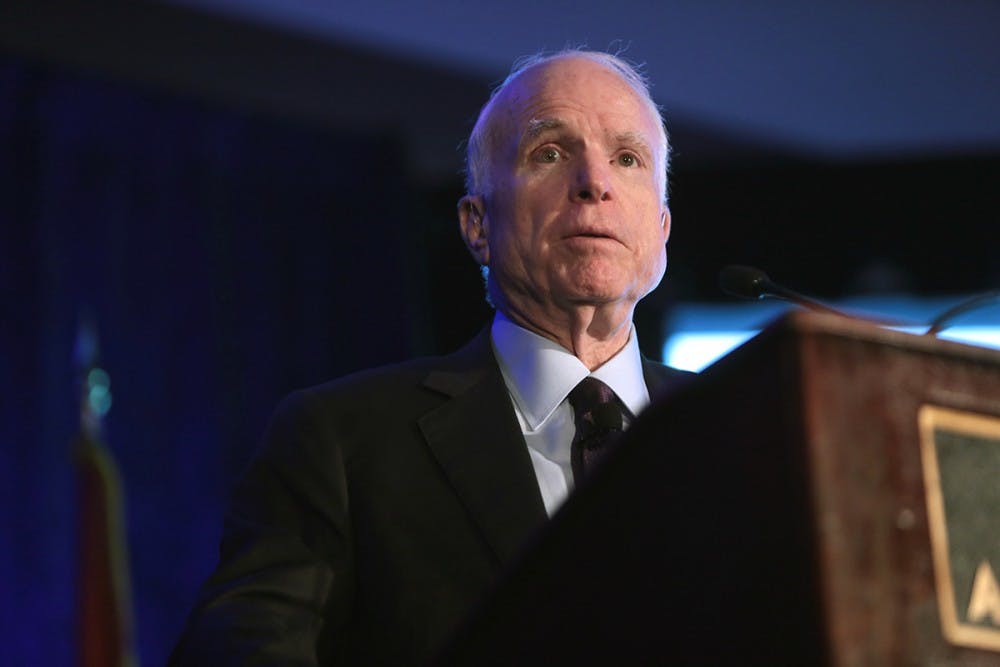Fourteen months ago, Sen. John McCain tentatively agreed to guest lecture for a U.Va. Law School course about the Vietnam War this fall — a subject McCain had experienced intimately as a U.S. Navy pilot in the war himself. A terminal brain cancer diagnosis shortly afterwards derailed the plans. McCain, who had represented Arizona since 1987 and ran as the Republican nominee in the 2008 presidential election, died Aug. 25 after he stopped receiving treatment for the cancer.
Legal and Policy Issues of the Indochina War is a course in the Law School co-taught by Profs. Robert Turner and John Moore. Open to U.Va. students pursuing any degree, the weekly seminar is imbued with distinguished experts. In the past, figures such as William Colby, former director of the Central Intelligence Agency, have guest lectured for the course.
This semester will likely be the seminar’s last run, Turner said, as both professors are approaching retirement.
Turner was an acquaintance and colleague of McCain. They first crossed paths when Turner was working as a national security advisor to Sen. Robert Griffin (R-Mich.), a member of the Senate Foreign Relations Committee in the mid-1970s. Turner was dealing with a medical mistreatment case from the mother of a constituent who was badly injured during the May 1975 Mayaguez rescue in Cambodia while serving for the Marines. He reached out to McCain to look into the situation, who was then the U.S. Navy’s liaison to the Senate.
According to Turner, McCain initially suspected that the mother had mixed up her facts, but he followed up nonetheless. A few hours later, he called Turner back, and confirmed that the Marines had mishandled the case.
McCain called back the next day and said, “Bob, you’re right, and we’re going to fix it,” according to Turner. He was immediately impressed by McCain’s honesty and principle.
“He’d never put me on a list of his top 10 friends, but I was a colleague he dealt with at the time,” Turner told The Cavalier Daily. “Both of us were Vietnam veterans, and we talked a little bit about the war.”
It was June of last year when Turner proposed the guest speaker position to McCain at a dinner event put on by the Thomas Jefferson Institute for Public Policy — a Virginia non-profit and non-partisan think-tank — where Turner is a board member. McCain was the speaker. According to Turner, the Arizona senator told Turner he would “love to do it,” and to contact his staff to work out the details.
But just a month later, Turner heard on the radio that McCain had been diagnosed with terminal brain cancer, and had about a year left to live. The connection with his staff was never made.
“I did not agree with him on a lot of issues, but I just had tremendous respect for him,” Turner said. “When I heard he has died, I literally had to pull my car over because I was just crying.”
McCain’s death last week has piqued interest in the statesman’s compelling life story and political legacy.
Before McCain was a politician — serving on the U.S. Senate for 31 years — the U.S. Naval Academy graduate served as a captain in the Navy. During his naval service in Vietnam, he was captured in Hanoi after his plane crashed. He notably turned down freedom from the brutal prison of war camp shortly thereafter, when his captors learned that he was the son of an influential Navy admiral in the Pacific. In choosing to stay with his fellow servicemen, McCain faced five and a half years of harsh imprisonment.
Turner said McCain’s lecture would have focused on his “horrible experience” as a tortured prisoner of war in a camp that left him unable to lift his arms above his head for the rest of his life. Despite the controversial nature of the Vietnam War, Turner said he believes McCain would have emphasized that we was proud of his service, while urging students to put the war behind them as he had. McCain would have “certainly” concluded the lecture on a positive note, encouraging young people to make a difference in the world.
“I laugh, because John often said he was the luckiest man in the world,” Turner said. “But an area I disagree with John in is that statement, because that would be me.”







